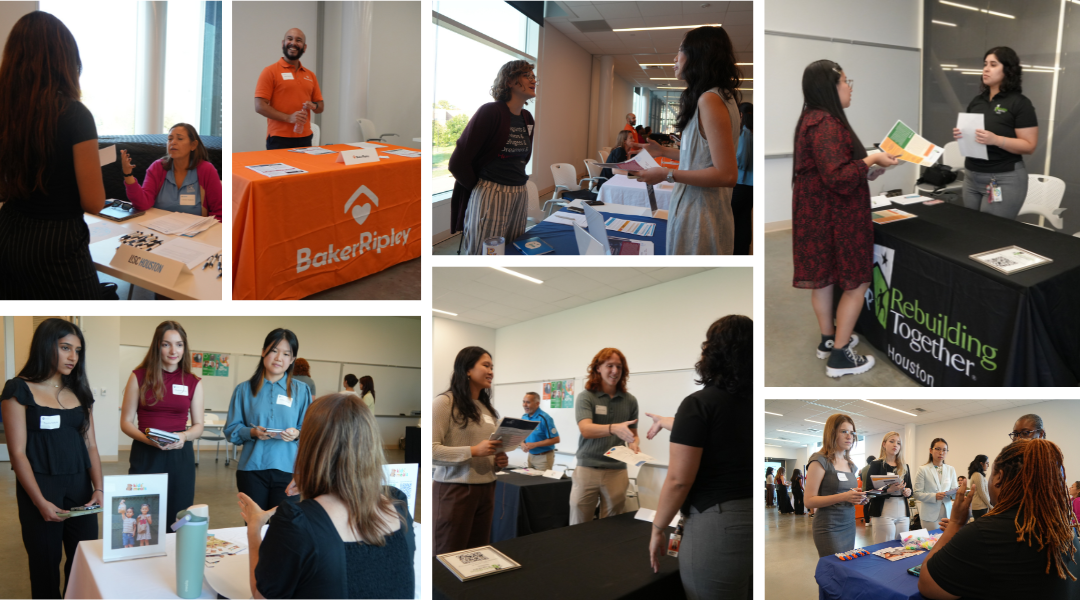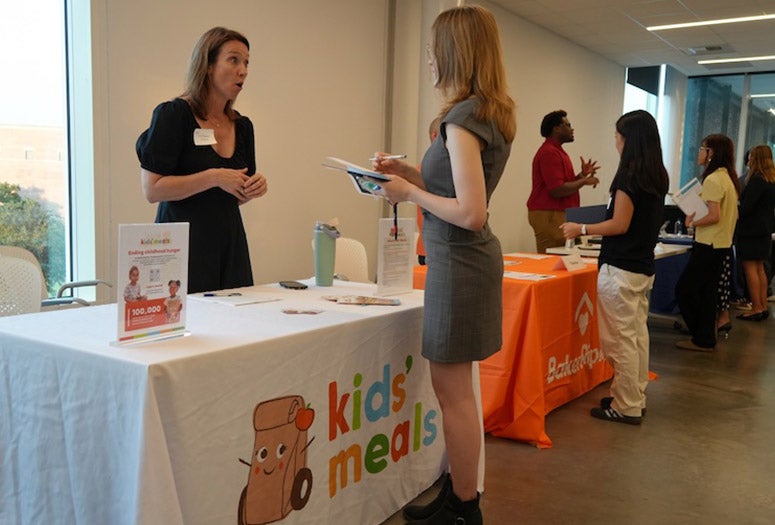When Anthony D’Souza ’21 walked into his first meeting as a Community Bridges Fellow, he said he didn’t know it would shape the course of his career. The Rice University alumnus spent the year working with Air Alliance Houston, studying how air pollution and environmental injustice disproportionately affect certain neighborhoods. Today, he works there full time — and this fall, he returned to the program that launched his career, this time as an employer recruiting the next Community Bridges Fellow.

“As a fellow, I learned about the inequities that shape urban areas like Houston and how they show up in air pollution and environmental justice,” he said. “Working on those issues every day solidified my desire to stay in this field.”
D’Souza said he stayed on at Air Alliance Houston after the fellowship because of the organization’s deep ties and trust across Houston’s neighborhoods.
“The prospect of continuing to work with these people, learn from their experiences and be part of a long-standing organization serving these communities — that spoke to both my professional goals and my personal history as someone born and raised in Karachi, Pakistan, a city with severe air quality issues,” he said.
Now he’s watching new students step into the same journey that shaped him.
“I hope they stay curious and build skills and connections that last their whole careers,” he said.
This fall, a new class of Community Bridges Fellows is beginning that same journey, stepping beyond the classroom and into the community through the program run by Rice’s Kinder Institute for Urban Research. The cohort of 32 students is partnering with 24 Houston nonprofits, applying what they’ve learned in the classroom to real-world challenges ranging from childhood hunger to environmental justice.

Launched in 2011, Community Bridges pairs undergraduates with local nonprofits for yearlong, research-driven fellowships aimed at addressing urban inequality. Students earn upper-level course credit while spending five to seven hours each week with their partner organization, designing projects that nonprofits often wouldn’t have the bandwidth or budget to pursue on their own.
“I love doing research, and the idea of actually using what I’m learning to help real organizations just really excited me,” said Amelia Brown, a sophomore from Virginia majoring in social policy analysis. “As an out-of-state student, I really wanted to step outside the hedges and connect with the Houston community beyond the Rice campus.”
Brown said she hopes to work with a nonprofit focused on environmental policy or mental health.
“It’s thrilling to get to use what we’ve learned at Rice in a way that makes a real difference,” she said.
“I’ve always been passionate about humanitarian work, and I think architecture can be a tool for that,” said Kirstie Qian, a junior from New York studying architecture. “Being part of Community Bridges lets me give back to the Houston community while learning how nonprofits make an impact. It’s shown me this is the kind of work I want to keep doing after college.”
Nonprofit partners say Community Bridges Fellows give them a chance to tackle long-shelved projects and inject fresh energy into their work.
Legacy Community Health has been part of the program for eight years, using student fellows to explore new strategies for improving patient outcomes.

“Sometimes we can get stuck in the status quo. These students see our work with fresh eyes — they tinker, they push, and they bring energy that reinvigorates our whole team,” said William Lyons, who oversees Legacy’s participation in the program. “At the end, we get to see real data, real recommendations and real impact.”
This year, Lyons said Legacy hopes its fellows will help refine its food prescription program and analyze new data linking food insecurity, housing challenges and chronic health conditions.
Kids’ Meals, which delivers more than 10,000 free lunches every weekday to preschooers across 56 ZIP codes, is back for its second year.
“We had one of the best fellows last year — she created a GIS map that helps us see where the greatest need lies,” said Ali Dodson, who leads strategic projects for Kids’ Meals. “We use it almost every day now as we plan where to grow next.”
Dodson said this year’s fellow will explore how artificial intelligence might improve their delivery and volunteer systems.
“We rely on donations, volunteers and word of mouth,” she said. “We have to be as efficient as possible to feed more kids.”
In the coming weeks, this year’s fellows will each be matched with a nonprofit partner and begin crafting proposals for research projects they will carry out through the spring. By the end of the academic year, they will present their findings at the Community Bridges’ spring celebration — not just as students but as collaborators helping Houston move forward.
“I wanted to find a way to use my skills to support organizations that are uplifting the community,” Brown said. “This program makes that possible.”

